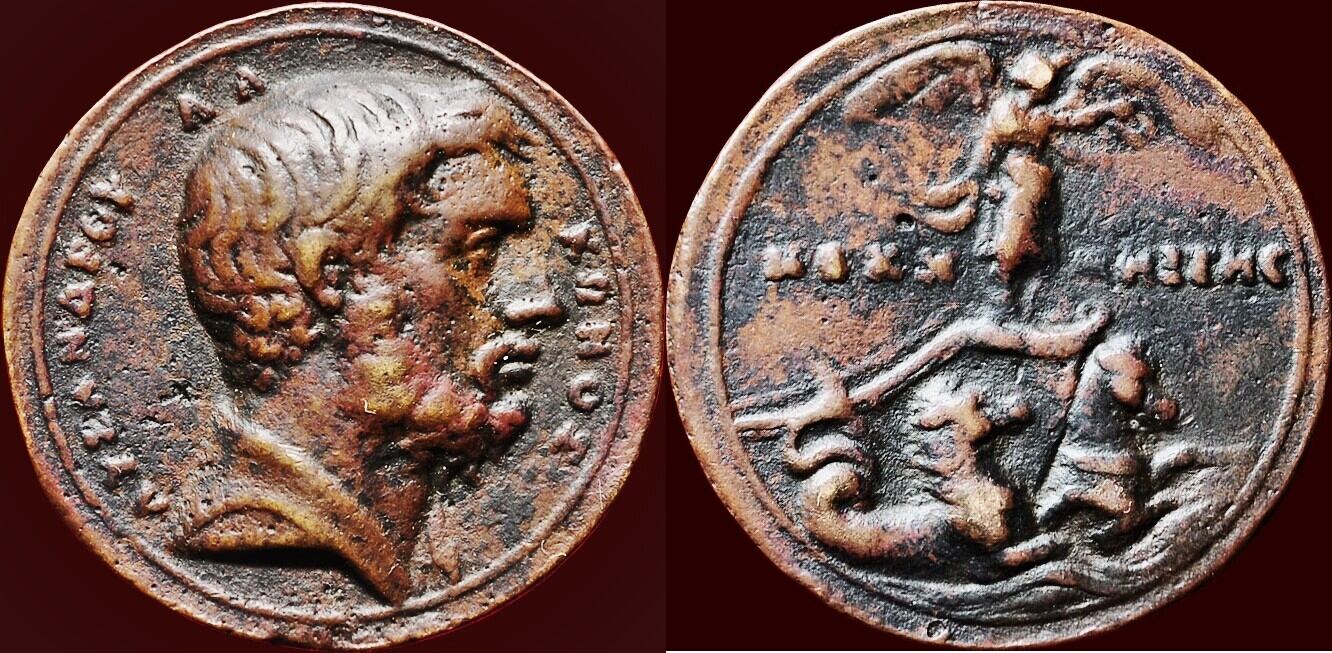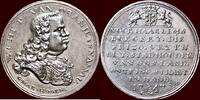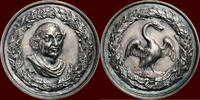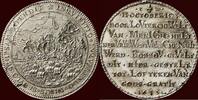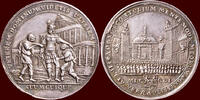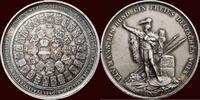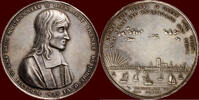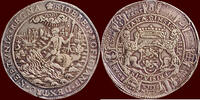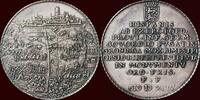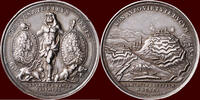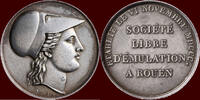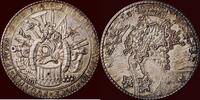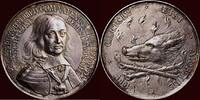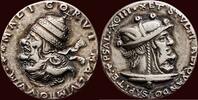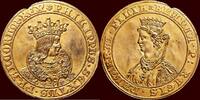MA-ID: 8509202010
Bewertungen Henzen
Schnelle Lieferung. Super Ware. Vielen Dank!
O.K.
perfekt !!!
Great coin, quick delivery, thanks!
medal ITALY - RENAISSANCE / EARLY MODERN TIMES - LYSANDER OF SPARTA - Cast n.d. (16th/18th century) ss
Munthandel G.Henzen 

10
Seit 10 Jahren bei MA-Shops
7244 Bewertungen,
100 % Positiv (seit 24 Monaten)
Weltweiter Versand
85,00 EUR
Differenzbesteuert nach §25a UStG
zzgl. 9,50 EUR Versand ( nach Deutschland )
Lieferzeit: 5 - 8 Tage*
zzgl. 9,50 EUR Versand ( nach Deutschland )
| Bestellhotline +49 (0)2871 2180 383 |
| Zahlungsarten |
| Überweisung |
weight 8,11gr. | bronze Ø 28mm.
designed by: Valerio Belli 1468-1546
obv. Bare-headed and draped bust of Lysander right,
surrounded by the legend ΛYΣANΔPOY ΛAKONOΣ
rev. Nikè standing right on prow of ship carried by two hippocamps,
holding wreath and sceptre NIKH - NHITHΣ across fields
Lysander was a Spartan admiral and statesman who was very influential during the final years of the Peloponnesian War and for the decade following. He was thought to be the son of a helot mother and a Spartan father. It is not known how he rose to eminence: he first appears as admiral of the Spartan navy in 407 BC, and two years later, he led the Spartans to a decisive victory at Aegospotami, and then blockaded the harbor at Athens until their surrender a year later. By 404 BC he was the most powerful man in the Greek world and set about completing the task of building up a Spartan empire. He was very influential in the replacement of democratic governments throughout Greece, with oligarchies under the control of Spartan governors. But Lysander′s boundless influence, and the honours paid him, roused the jealousy of the kings and the ephors, and, on being accused by the Persian satrap Pharnabazus, he was recalled to Sparta. Soon afterwards he was sent to Athens with an army to aid the oligarchs, but Pausanias, one of the kings, followed him and brought about a restoration of democracy. On the death of Agis II., Lysander secured the succession of Agesilaus, whom he hoped to find amenable to his influence. But in this he was disappointed. Though chosen to accompany the king to Asia as one of his thirty advisers, he was kept inactive and his influence was broken by studied affronts, and finally he was sent at his own request as envoy to the Hellespont. He soon returned to Sparta to mature plans for overthrowing the hereditary kingship and substituting an elective monarchy, but his efforts were fruitless, and his schemes were cut short by the outbreak of war with Thebes. In 395 BC, Lysander invaded Boeotia from the west, receiving the submission of Orchomenus and sacking Lebadea, but the enemy intercepted his despatch to Pausanias, who had meanwhile entered Boeotia from the south, containing plans for a joint attack upon Haliartus. The town was at once strongly garrisoned, and when Lysander marched against it he was defeated and slain. He was buried in the territory of Panopeus, the nearest Phocian city. An able commander and an adroit diplomatist, Lysander was fired by the ambition to make Sparta supreme in Greece and himself in Sparta. To this end he shrank from no treachery or cruelty yet, like Agesilaus, he was totally free from the characteristic Spartan vice of avarice, and died, as he had lived, a poor man. Part of a series of some fifty medals prepared by Belli, portraying famous personalities of antiquity. The piece offered here is not an original from Belli, but a later cast.
HMB III.40 | cf. Attwood 357c
vf
designed by: Valerio Belli 1468-1546
obv. Bare-headed and draped bust of Lysander right,
surrounded by the legend ΛYΣANΔPOY ΛAKONOΣ
rev. Nikè standing right on prow of ship carried by two hippocamps,
holding wreath and sceptre NIKH - NHITHΣ across fields
Lysander was a Spartan admiral and statesman who was very influential during the final years of the Peloponnesian War and for the decade following. He was thought to be the son of a helot mother and a Spartan father. It is not known how he rose to eminence: he first appears as admiral of the Spartan navy in 407 BC, and two years later, he led the Spartans to a decisive victory at Aegospotami, and then blockaded the harbor at Athens until their surrender a year later. By 404 BC he was the most powerful man in the Greek world and set about completing the task of building up a Spartan empire. He was very influential in the replacement of democratic governments throughout Greece, with oligarchies under the control of Spartan governors. But Lysander′s boundless influence, and the honours paid him, roused the jealousy of the kings and the ephors, and, on being accused by the Persian satrap Pharnabazus, he was recalled to Sparta. Soon afterwards he was sent to Athens with an army to aid the oligarchs, but Pausanias, one of the kings, followed him and brought about a restoration of democracy. On the death of Agis II., Lysander secured the succession of Agesilaus, whom he hoped to find amenable to his influence. But in this he was disappointed. Though chosen to accompany the king to Asia as one of his thirty advisers, he was kept inactive and his influence was broken by studied affronts, and finally he was sent at his own request as envoy to the Hellespont. He soon returned to Sparta to mature plans for overthrowing the hereditary kingship and substituting an elective monarchy, but his efforts were fruitless, and his schemes were cut short by the outbreak of war with Thebes. In 395 BC, Lysander invaded Boeotia from the west, receiving the submission of Orchomenus and sacking Lebadea, but the enemy intercepted his despatch to Pausanias, who had meanwhile entered Boeotia from the south, containing plans for a joint attack upon Haliartus. The town was at once strongly garrisoned, and when Lysander marched against it he was defeated and slain. He was buried in the territory of Panopeus, the nearest Phocian city. An able commander and an adroit diplomatist, Lysander was fired by the ambition to make Sparta supreme in Greece and himself in Sparta. To this end he shrank from no treachery or cruelty yet, like Agesilaus, he was totally free from the characteristic Spartan vice of avarice, and died, as he had lived, a poor man. Part of a series of some fifty medals prepared by Belli, portraying famous personalities of antiquity. The piece offered here is not an original from Belli, but a later cast.
HMB III.40 | cf. Attwood 357c
vf
Bitte beachten Sie unsere Mindestabnahme von 20 Euro. Sendungen nach China sind auf Gefahr des Käufers und nur Zahlung per banküberweisung. An PayPal und Kreditkarte Zahlungen sind immer Verwaltungs- und Risikokosten verbunden. Sendungen nach Russland, Ukraine und israel sind nicht möglich. Der Versand erfolgt innerhalb von 5 Tagen nach Zahlungseingang. BITTE KEIN PAYPAL ODER KREDITKARTE ZAHLUNGEN FÜR EU. Zahlen Sie bitte immer nur mit IBAN; schnell, billig und zuverlässich.
| Versandkosten | ||||
|---|---|---|---|---|
| bis 100,00 EUR | 100,00 EUR bis 500,00 EUR | 500,00 EUR bis 1000,00 EUR | über 1000,00 EUR | |
| Argentinien | 32,00 EUR | 32,00 EUR | 40,00 EUR | 40,00 EUR |
| Australien | 35,00 EUR | 35,00 EUR | 40,00 EUR | 40,00 EUR |
| Belgien | 9,50 EUR | 11,00 EUR | 13,00 EUR | 18,00 EUR |
| Brasilien | 55,00 EUR | 55,00 EUR | 55,00 EUR | 55,00 EUR |
| Bulgarien | 14,00 EUR | 16,00 EUR | 35,00 EUR | 45,00 EUR |
| Chile | 50,00 EUR | 50,00 EUR | 50,00 EUR | 50,00 EUR |
| China | 40,00 EUR | 40,00 EUR | 50,00 EUR | 50,00 EUR |
| Dänemark | 11,50 EUR | 13,00 EUR | 16,00 EUR | 20,00 EUR |
| Deutschland | 9,50 EUR | 11,00 EUR | 13,00 EUR | 18,00 EUR |
| Estland | 13,00 EUR | 14,00 EUR | 15,00 EUR | 25,00 EUR |
| Frankreich | 9,50 EUR | 11,00 EUR | 16,00 EUR | 25,00 EUR |
| Griechenland | 15,00 EUR | 25,00 EUR | 30,00 EUR | 35,00 EUR |
| Großbritannien | 25,00 EUR | 25,00 EUR | 26,00 EUR | 28,00 EUR |
| Hong Kong | 40,00 EUR | 40,00 EUR | 50,00 EUR | 50,00 EUR |
| Indien | 35,00 EUR | 35,00 EUR | 40,00 EUR | 50,00 EUR |
| Indonesien | 35,00 EUR | 35,00 EUR | 40,00 EUR | 40,00 EUR |
| Israel | 200,00 EUR | 200,00 EUR | 200,00 EUR | 200,00 EUR |
| Japan | 40,00 EUR | 40,00 EUR | 40,00 EUR | 40,00 EUR |
| Kambodscha | 65,00 EUR | 65,00 EUR | 65,00 EUR | 65,00 EUR |
| Kanada | 30,00 EUR | 30,00 EUR | 35,00 EUR | 35,00 EUR |
| Liechtenstein | 20,00 EUR | 20,00 EUR | 25,00 EUR | 25,00 EUR |
| Luxemburg | 11,00 EUR | 13,00 EUR | 16,00 EUR | 25,00 EUR |
| Malaysia | 35,00 EUR | 35,00 EUR | 40,00 EUR | 45,00 EUR |
| Niederlande | 8,50 EUR | 8,50 EUR | 11,00 EUR | 14,00 EUR |
| Norwegen | 25,00 EUR | 25,00 EUR | 30,00 EUR | 35,00 EUR |
| Österreich | 11,50 EUR | 12,50 EUR | 15,00 EUR | 25,00 EUR |
| Polen | 13,00 EUR | 14,00 EUR | 16,50 EUR | 25,00 EUR |
| Portugal | 13,00 EUR | 14,00 EUR | 18,00 EUR | 25,00 EUR |
| Rumänien | 16,00 EUR | 18,00 EUR | 25,00 EUR | 35,00 EUR |
| Russische Föderation | 200,00 EUR | 200,00 EUR | 200,00 EUR | 200,00 EUR |
| Schweiz | 30,00 EUR | 30,00 EUR | 40,00 EUR | 40,00 EUR |
| Serbien | 25,00 EUR | 25,00 EUR | 30,00 EUR | 35,00 EUR |
| Singapur | 35,00 EUR | 35,00 EUR | 35,00 EUR | 40,00 EUR |
| Slowakei | 13,00 EUR | 15,00 EUR | 20,00 EUR | 25,00 EUR |
| Spanien | 11,50 EUR | 13,50 EUR | 16,50 EUR | 25,00 EUR |
| Sri Lanka | 35,00 EUR | 35,00 EUR | 40,00 EUR | 45,00 EUR |
| Tschechische Republik | 12,00 EUR | 14,00 EUR | 18,00 EUR | 25,00 EUR |
| Ukraine | 200,00 EUR | 200,00 EUR | 200,00 EUR | 200,00 EUR |
| Ungarn | 14,00 EUR | 16,00 EUR | 25,00 EUR | 30,00 EUR |
| Vereinigte Staaten von Amerika | 32,00 EUR | 32,00 EUR | 35,00 EUR | 40,00 EUR |
| Europäische Union | 15,00 EUR | 17,00 EUR | 25,00 EUR | 30,00 EUR |
| Welt | 40,00 EUR | 40,00 EUR | 50,00 EUR | 50,00 EUR |
Informationen zum Kauf bei MA-Shops
Bestellungen bei MA-Shops sind jederzeit möglich und werden innerhalb von 2-4 Arbeitstagen verschickt.
Ein über die MA-Shops abgesicherter Kauf findet niemals außerhalb von MA-Shops statt.
Bestellen Sie sicher online mit dem MA-Shops Warenkorb.
Vielen Dank.
Ein über die MA-Shops abgesicherter Kauf findet niemals außerhalb von MA-Shops statt.
Bestellen Sie sicher online mit dem MA-Shops Warenkorb.
Vielen Dank.
|
Verkäufer-Startseite | 0Warenkorb | AGB | Impressum | MA AGB | Datenschutzerklärung | Garantie | MA-Shops Neuzugänge Copyright ® 2001-2025, MA-SHOPS Muenzen All Rights Reserved. Designated trademarks and brands are the property of their respective owners. |
 Münzen beim Fachhändler kaufen
Münzen beim Fachhändler kaufen


